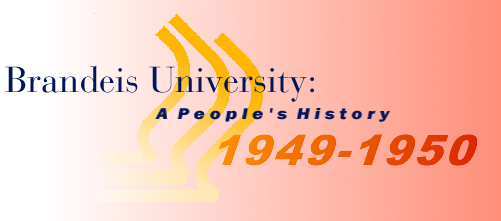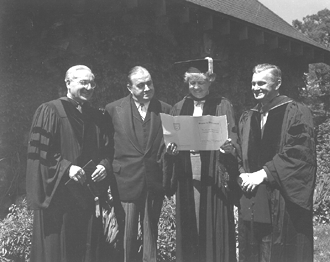1949-1950

 Of the many relationships Brandeis University has enjoyed with prominent public figures, none was warmer than that with former First Lady Eleanor Roosevelt. In the University's second year she joined its Board of Trustees, remaining an active participant in decision-making until her death in 1962, and for much of that time served as a member of the faculty as well, offering a course on international affairs that drew on her experiences as U.S. Ambassador to the United Nations. In the Spring of 1950 she appeared as the principal speaker at the second annual convocation. Looking over the crowd of faculty, staff, students with their parents, and friends and supporters of the University, she observed,
Of the many relationships Brandeis University has enjoyed with prominent public figures, none was warmer than that with former First Lady Eleanor Roosevelt. In the University's second year she joined its Board of Trustees, remaining an active participant in decision-making until her death in 1962, and for much of that time served as a member of the faculty as well, offering a course on international affairs that drew on her experiences as U.S. Ambassador to the United Nations. In the Spring of 1950 she appeared as the principal speaker at the second annual convocation. Looking over the crowd of faculty, staff, students with their parents, and friends and supporters of the University, she observed,
“It is indeed a sign of faith that so many people have gathered here to celebrate and show their interest in a university that is scarcely two years old. Those who come here to study have a very great gift, because they come to a University that is founded on the principles of democracy. ... And because so many people throughout this nation are showing their interest in this University, those of us who feel that one of the most important things in the world today is to show our belief in democracy are greatly heartened.”
Mrs. Roosevelt would come to occupy a special place in the life of Brandeis University, as her many appearances throughout this history will attest. Hers was an invaluable role in establishing what President Sachar would later describe as Brandeis's “special character.”
—Staff
By the beginning of the University’s second year, the spirit of loyal opposition characteristic of Brandeis students was already beginning to stir. President Sachar’s policy of enticing new faculty to Brandeis by promising extensive research opportunities troubled some students, who held that an emphasis on faculty research impinged on the business of teaching. Despite their conviction that a vigorous research program “would constitute a rude contradiction to what we, the students, have been led to expect and believe,” Brandeis University’s history of high quality research has proven that students only profit by the opportunity to learn from teachers dedicated to expanding knowledge in their fields.
—Staff
In April the University made its first foray in continuing education with the Institute for Adult Education, a night school offering five series of lectures in literature, music, social sciences, American studies and Bible studies. Brandeis faculty contributed their expertise for most of these: Max Lerner lectured on “Problems in American Civilization” and Shlomo Marenhof on “New Views on the Old Testament.” Ludwig Lewisohn and Milton Hindus contributed to the series on “Modern Literature,” joined by three guest lecturers, including Dylan Thomas (described by The Justice as “a Welsh poet”). The guest speakers for the “Contemporary Music” series constituted a Who’s Who of prominent composers: Roy Harris, William Schuman (then president of the Juilliard School of Music), René Leibowitz, Lukas Foss, Marc Blitzstein and Aaron Copland all appeared to offer their thoughts on the vexing question of “whither music?”
—David Lieberman, Graduate student, Music
Residents of the Smith Hall dorm presented the first “Hi Charlie” revue on April 22. The loose collection of original skits, originally an all-male production, eventually went co-ed and became a Brandeis tradition. No one ever figured out who Charlie was.
—Staff